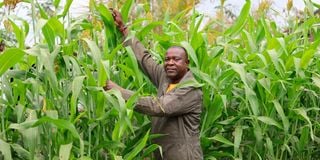
G-Biack Centre founder Samuel Nderitu.
At the heart of Muguga in Gatuanyaga area, Thika, is G-Biack Centre – a model farm and an agricultural centre that majors in equipping smallholder crop and animal producers with skills to make maximum profit.
G-Biack Centre does this through demonstrations and training. It shows the smallholder farmers how to produce nutritious, healthy and safe foods on their land.
The model farm is a site to behold. It has many varieties of crops that are grown organically on more than 160 double dug beds.
It also has goats, fish, rabbits and indigenous chickens.
“We can afford to feed them with what we produce here organically,” farm founder and director, Samuel Nderitu, tells the Seeds of Gold.

Samuel Nderitu tends to his crops at a section of the farm in Gatuanyaga in Thika.
The birds are fed from some of the crops grown on the farm. Their coops are strategically placed above the ponds. The chicken waste that falls in the ponds is eaten by the fish.
Nderitu’s preferred fish is tilapia. He says the species can can grow anywhere, as long as there is a water inlet and outlet.
“The water from the pond is in turn used to irrigate the crops as it has a lot of nitrogen,” Nderitu says.
He also grows azolla and rears black soldier flies that act as feed for some of the animals.
“This is integrated farming, a wholesome management system that meets multiple demands, including securing livelihoods and food security while delivering a more sustainable agriculture,” Nderitu says.
“We teach farmers to produce vast quantities of healthy food from the little land they have. There is no wastage.”
The farm has a “man-made river”, whose source is rain water. This allows G-Biak to grow crops at any time of the year.
G-Biack Centre was founded in 2008. The objective was to help train farmers on eradicating poverty.
Nderitu advises farmers to maintain the fertility of soil on their land.
“Many farms are not fertile because of excessive use of chemicals,” he says.
G-Biack Centre has trained more than 20,000 farmers to produce food sustainably.
Nderitu, who received training at the California University Department of Agroecology Davis Santa Cruz, the Ecology Action in Willits California and at Manor House Agricultural Centre in Kitale, says: “Bio-intensive agriculture is sustainable. The method focuses on maximising harvests while minimising resource use, particularly land, water and energy.”
“Optimising plant spacing and intensive growing techniques can lead to high yields on small plots, making the method ideal for urban or small farmers.”
To create the river, Nderitu first identified a catchment area where he made rooftops and other infrastructure to collect rainwater.
The collected water was then stored in tanks, ponds and other reservoirs, with the excess being directed to the ground using trenches.
“One can also make contour trenches on slopes to slow down the water runoff, thus allowing it to seep into the soil and gradually feed into a natural stream or river system,” Nderitu says.

Samuel Nderitu, the founder and director of G-Biack Centre.
With the water banks, Nderitu is assured of a steady supply throughout the year and a more money in the dry seasons.
Nderitu says deep soil preparation and the regular use of compost enhances soil health, leading to sustainable long-term productivity.
G-Biack Centre relies on locally available resources like compost and saved seeds to minimise the need for chemical fertiliser, pesticides and imported seeds.
“This kind of farming also helps to sequester carbon in the soil, reduces erosion and maintains biodiversity, making it environmentally friendly,” he says.
“The close plant spacing and deep soil preparation helps improve water retention, thus reducing the need for irrigation.”
For well-cured manure, Nderitu employs the cold composting method.
This involves composting organic material at a slow natural pace without the need for regular turning or management to maintain high temperature.
“Unlike hot composting, which generates heat through rapid microbial activity, cold composting works at ambient temperatures. The decomposition can take several months,” he says.
Nderitu says cold composting is a simple and effective way to recycle organic waste into valuable compost, especially for gardeners who are for a low-maintenance approach.
The final compost is rich in nutrients and beneficial micro-organisms, making it excellent when it comes to improving soil fertility and reducing waste.
There is no use of chemicals at G-Biack Centre, even the bio-chemicals that are considered organic.
“The presence of some pests shows that the ecosystem is healthy. If one does not find harmful insects, it turns out that they are using the wrong approaches as there should be the beneficial and non-beneficial organisms that eventually control themselves. With this, pollution of the environment is minimised,” he says.





